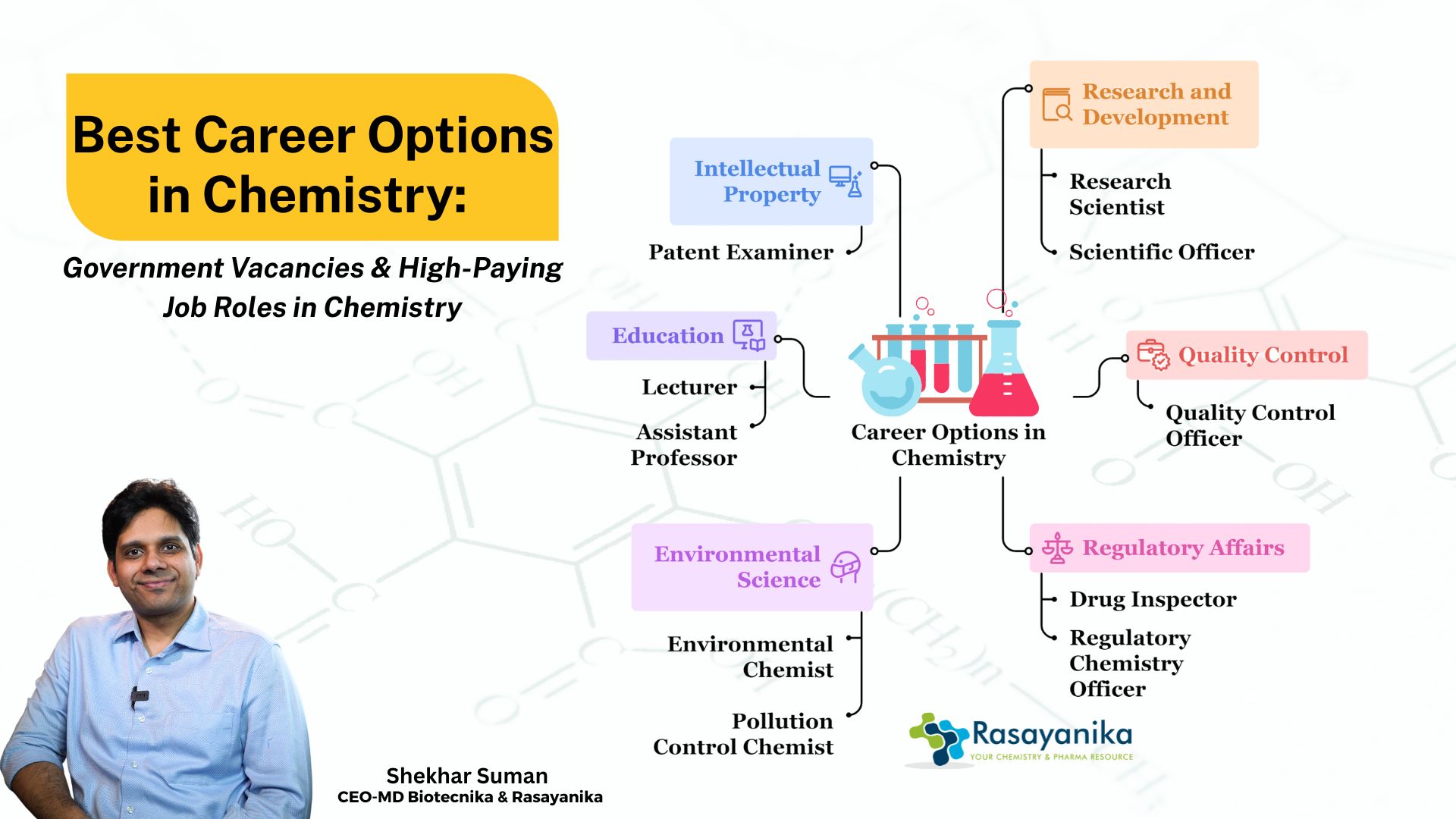Table of Contents
Best Career Options in Chemistry: Government Vacancies & High-Paying Job Roles in Chemistry
If you are an MSc graduate who is looking to excel in your career, there are multiple Career Options in Chemistry. After completing your master’s degree, most of you must be wondering which career path to choose next. Whether you’re aiming for impactful public-sector positions or high-paying roles in research and industry, there are plenty of pathways to explore.
With the advent of science and technology, the current scientific community offers dynamic opportunities for research enthusiasts like you. The trends have changed, and we can observe that career options in chemistry have expanded and are no longer confined to lab benches. Here, we have curated how one can secure a Chemistry Government Jobs in India.
This article aims to help you understand the career trends and insights into the most promising avenues, particularly focusing on jobs for MSc chemistry in government. It provides an opportunity to shape and advance your career in chemistry.
Why Focus on Career Options in Chemistry Now?
Chemistry plays a very important role in most of the modern research and development. From the pharmaceutical sector to environmental monitoring, chemistry ensures regulatory frameworks as well. Hence, we observe a significant demand for candidates interested in pursuing a career in chemistry. The demand for qualified chemists is high and growing across multiple industries. This creates several vacancies in the industry and helps interested candidates to grab the opportunities. For an MSc holder in chemistry, there is a special advantage: you possess both advanced theoretical knowledge and practical lab skills. Leveraging this opportunity helps to learn more about the chemistry government jobs in India. This also provides us with information such as which sector offers job security and where one can contribute to large-scale public initiatives.
Top Career Options in Chemistry (with Government & High-Paying Roles)
Here are some of the standout roles you can pursue with your MSc in chemistry, especially those oriented toward government employment or high remuneration:
1. Research Scientist / Scientific Officer
This role will be a perfect fit for those fascinated by research. Scientist roles are among the prestigious government jobs one can opt for after completing their master’s and further studies. The projects can include advanced topics in various areas, such as materials, catalysis, environmental chemistry, or drug development.
Qualification: Typically requiring a PhD or CSIR-NET qualification.
Eligible organisations include premier institutions and national labs. They hire candidates only through online entrance exams, and candidates should clear the necessary competitive exams. These fall under the broad sections of chemistry government jobs in India.
Salary potential: Entry-level roles start around ₹6-7 lakhs per annum and can increase significantly with experience.
2. Quality Control Officer
Quality control jobs are one of the high-demand careers in the pharma and life science sectors. They are responsible for the safety of products that are in the market as well as products that should enter the market.
Qualification: One should have a strong analytical chemistry background to thrive in the QC sector. They will be monitoring the materials as well as verifying the compliance of products.
Candidates can choose job roles in different sectors such as oil, petrochemicals, and the pharmaceutical industry. This can be one of the best jobs one can choose after an MSc in chemistry.
Salary potential: Typical salary for mid-level analysts: around ₹5–7 lakhs per annum and higher with certifications.
3. Drug Inspector / Regulatory Chemistry Officer
If you are a candidate interested in drug safety jobs, these career options in chemistry would be a perfect fit.
Qualification: A drug inspector or a regulatory chemistry officer is an excellent career after an MSc chemistry. In these roles, officers are entitled to ensure the safety and compliance of medications, and often work in government institutions or affiliated bodies.
These functions are among the specialised chemistry government jobs in India.
Salary potential: We can observe that the salary range varies widely by state and role. Candidates who gain experience and gain senior posts are likely to earn more than senior grades of ₹10 lakhs per annum.
4. Environmental / Pollution Control Chemist
With global focus shifting to sustainability and pollution, chemists have an edge. Monitoring air, water, and soil quality, assessing industrial impacts, these are growing career options in chemistry. Many such posts exist in government regulatory boards and environmental agencies. These roles combine scientific challenge and public service.
Salary potential: Salary ranges can start at ₹4-5 lakhs per annum and rise into higher scales for senior roles.
5. Lecturer / Assistant Professor in Higher Education
Teaching remains a solid and respected path. For MSc chemistry graduates, pursuing a teaching career in colleges or universities is a reliable career after MSc chemistry. You can clear eligibility tests (NET/SET) and apply for faculty roles. Government colleges especially offer stable pay and benefits.
Salary potential: Entry-level salaries start around ₹6-8 lakhs per annum (including allowances) and can grow with seniority.
6. Junior Research Fellow / Project Associate in Government-funded Research
If you wish to continue research but are early in your career, roles like JRF (Junior Research Fellow) or Project Associate give you a foot in the door. These are among the viable jobs after MSc chemistry when you’re building your profile. These positions allow you to work at government labs, often as precursors to permanent posts.
7. Patent Examiner / Intellectual Property (Chemistry)
For those inclined towards innovation, law, and regulation, working as a patent examiner or IP specialist is a unique career option in chemistry. You’ll evaluate chemical inventions and interface with legal/regulatory frameworks. Some such jobs are in government or quasi-government organizations.
This role can offer high remuneration, especially when you gain expertise and handle major cases.
How to Secure These Jobs for MSc Chemistry in Government
One should have a thorough knowledge of the competitive exams required to clear beforehand. This will make the path easier and help one understand the difficulties beforehand. Most government jobs require candidates to clear competitive exams and achieve good academic scores. In this article, we have curated a few tips to help you successfully pass such exams.
- Build strong subject knowledge: this will be the first and foremost step in advancing your career, irrespective of the path you choose. One should have a strong foundation, then only can one build a career that lasts long. One should be well-versed in theoretical knowledge concepts such as analytical techniques, spectroscopy, and organic/inorganic chemistry. These concepts clearly help the candidates to thrive in the industry as well as secure Chemistry Government Jobs in India.
- Gain lab experience: Along with strong theoretical knowledge, one should gain hands-on experience to excel in the industry. This could be possible with Internships and research projects. They will not only help you understand the concepts better but also help you gain experience. Thorough instrument operation (HPLC, GC, MS) is highly valued in both industry and government roles.
- Qualify competitive exams: One of the simplest yet most challenging ways to expand career options in chemistry is to qualify for exams. For any government job, it is through qualifying for the competitive exams. Many government chemistry jobs in India require clearing exams such as the NET, GATE, CSIR JRF, or state PSC exams. A qualified candidate will always have the upper hand in the job market.
- Stay updated on job notifications: being informed about current vacancies and applying at the right time are crucial steps in securing your dream job. Government vacancies for MSc chemistry come up in labs, PSUs, and regulatory agencies. One can follow or subscribe to pages that constantly post recent job vacancies, such as Rasayanika. In this way, one will not miss out on opportunities.
- Develop complementary skills: Communication, regulatory knowledge, and data analysis (e.g., using software) are increasingly important.
- Consider further studies: Although not always mandatory, a PhD can open more research or academic roles and push your earning potential.
If you are about to finish your master’s or already have a master’s degree and are looking for government jobs, this article would have given you insights on how to move forward. An MSc chemistry degree will definitely provide you with a wide range of opportunities and will allow you to get into government sectors as well. These high-paying jobs will not only help you build a strong career but also provide financial stability throughout. One should be open to embracing these possibilities and make sure to stay updated and curious. This will definitely help gain confidence and thrive wisely in the industry.
Frequently Asked Questions (FAQs)
Q1: Is an MSc in chemistry sufficient for getting government jobs in chemistry?
Yes. An MSc in Chemistry is the fundamental qualification for many roles. Some roles might prefer or require additional certification or a PhD, but many entry-to-mid-level opportunities are accessible.
Q2: What are the best careers after an MSc in chemistry if I don’t want to do research?
If you prefer non-research paths, roles such as regulatory chemist, quality control, environmental monitoring, teaching, or patent/IP are excellent and among the top career options in chemistry.
Q3: How often do government vacancies open up for MSc chemistry graduates?
Quite regularly. Recruitment notices for laboratories, PSUs, regulatory boards, and teaching institutions are published periodically throughout the year. Stay alert.
Q4. What are the top career options in chemistry for 2025?
The best career options in chemistry include analytical chemistry, pharmaceuticals, chemical engineering, and regulatory affairs. Emerging areas like green chemistry, nanotechnology, and forensic science also offer excellent job prospects and growth in both government and private sectors.
Q5. How can students explore different career options in chemistry?
Students can explore career options in chemistry through internships, research projects, and certifications in fields like medicinal or environmental chemistry. Participating in programs like CSIR-NET or GATE also helps in building a strong career foundation.
















































